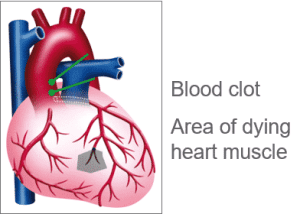As we have seen in recent years, many fit and young people and athletes have suffered from Cardiac Arrest. I was often considered that such instances only affected the older, or less fit members of the community, but heart disease is now becoming more prevalent within all ages and abilities within society.
There are two main types of chest pain which are a cause for concern. Angina, which if you imagine is a blockage in the plumbing of the heart, is triggered after exertion or a cause of stress, and most individuals are diagnosed with condition.

The individual will carry a GTN (Glyceryl Trinitrate) Spray, and will spray this under their tongue, when they are suffering from central chest pain, which may radiate up into neck, back, and down left arm. They may appear pale and grey with ashen skin, blue lips and complaining of breathing difficulties, or shortness of breath.
In such instances, the individual should be encouraged to use GTN Spray. They may take it twice, five minutes apart and be at rest. If no improvement within 15 mins max call 999 / 112 and be prepared to resuscitate.
With a heart attack, or cardiac arrest, the chest pain often has a sudden onset, and the individual may have no previous history of heart problems.

The individual will often complain of central chest pain, which radiates up into neck, through to the back and down left arm. They again may have a grey, pale and ashen complexion, with blue lips. They may also complain of chest pain, difficulty breathing, and an impending feeling of doom and gloom.
You may give the individual 300mg Aspirin to chew., which you can buy off the shelf in many shops and supermarkets. Make the individual comfortable in whichever position they find most comfortable and call 999 / 112 for an ambulance, and be prepared to resuscitate.
Many public places, such as shopping centres, supermarkets, train stations and airports have Public Access Automatic External Defibrillators (AED’s). If one is nearby, send someone to get it, as if you should have to resuscitate, the application and use of the AED will assist with improving the outcome for the individual, should you have to resuscitate.
AED’s are easy to use, giving you voice prompts of what to do, how and when. When using an AED, you can do no harm. The sooner you use it on a non-breathing patient, the possibility of a positive outcome for the patient increases.
Many rural communities are having Public access AED’s installed outside their village halls, churches, village shops and old telephone boxes, so when you dial 999 / 112 for an ambulance, you may be directed to its location. The operator receiving your call will remain on the line with you, and talk you through what you need to do, so if you have a mobile phone it is a good idea to put it on speakerphone.
As with all first aid, the worst thing that you can do, is do nothing! By doing something, you are giving the individual a chance of survival, that they may not otherwise have.
If you would like some first aid training in relation to these and other conditions, please do not hesitate to contact Passion First Aid on 07811 025169, email enquiries@passionfirstaid.co.uk, or go to our website, www.passionfirstaid.co.uk.
